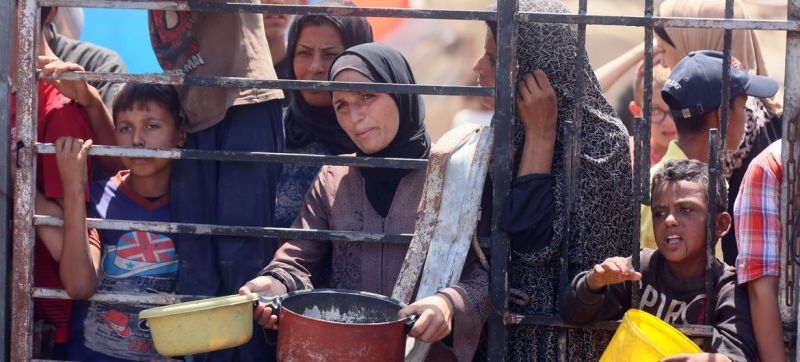- Trump says US aims to destroy Iran's military, topple government |
- Stock indices rally at DSE, CSE despite shrinking turnover |
- Tehran hits back across region after US and Israel attack Iran |
- African Union calls for restraint in Middle East |
- Iran-Israel Tensions Stoke Energy Risks for Bangladesh |
Over 1,370 Palestinians Killed Seeking Food in Gaza: UN

Women and children wait for food at a community kitchen in western Gaza City.
Despite Israel’s 27 July announcement of daily military pauses in western Gaza “to improve humanitarian responses,” Israeli forces have continued attacks along food convoy routes and near Gaza Humanitarian Foundation (GHF) aid sites, according to the UN human rights office in Palestine (OHCHR).
Between 30 and 31 July alone, 105 Palestinians were killed and at least 680 more injured along convoy routes in the Zikim area in North Gaza, southern Khan Younis, and near GHF sites in Middle Gaza and Rafah, OHCHR said in a press release issued on Friday.
In total, since 27 May, at least 1,373 Palestinians have been killed while seeking food — 859 in the vicinity of GHF sites and 514 along food convoy routes.
OHCHR noted that most of the killings were committed by the Israeli military. While it acknowledged the presence of other armed elements in the same areas, it said it had no information indicating their involvement in the killings.
“[The office] has no information that these Palestinians were directly participating in hostilities or posed any threat to Israeli security forces or other individuals. Each person killed or injured had been desperately struggling for survival, not only for themselves but also for their families and dependents,” it stated.
The office emphasised that intentionally directing attacks against civilians not taking part in hostilities, and intentionally using starvation of civilians as a method of warfare by depriving them of objects indispensable to their survival — including willfully impeding relief supplies — are war crimes.
“If part of a systematic or widespread attack on the civilian population, these may also constitute crimes against humanity,” OHCHR added, noting the cumulative impact of these incidents and humanitarian access restrictions.
“Each of these killings must be promptly and independently investigated, and those responsible held to account. Urgent measures must be put in place to prevent recurrence,” the office said.
Meanwhile, the UN Relief and Works Agency for Palestine Refugees (UNRWA) underscored the need to open road crossings to supply aid at scale across the Gaza Strip.
“Airdrops are at least 100 times more costly than trucks. Trucks carry twice as much aid as planes,” UNRWA Commissioner-General Philippe Lazzarini said on social media.
“If there is political will to allow airdrops — which are highly costly, insufficient, and inefficient — there should be similar political will to open the road crossings,” he stressed.
Mr Lazzarini further noted that UNRWA has 6,000 trucks loaded with aid stuck outside Gaza, waiting for permission to enter.
During the ceasefire earlier this year, UNRWA and other UN agencies were able to bring in 500 to 600 trucks of aid each day.
“Aid reached the entire population of Gaza in safety and dignity. It succeeded in reversing the deepening starvation without any aid diversion,” the UNRWA head said.
“Let us go back to what works, and let us do our job.”

